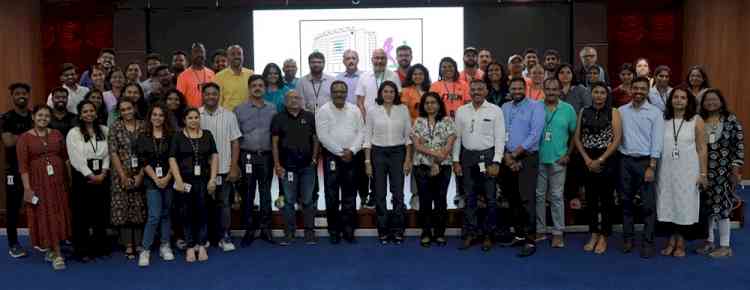India, China ask world to adhere to Panchsheel principles (Roundup)
Beijing, June 28 (IANS) India and China Saturday observed the 60th anniversary of the Panchsheel agreement, enunciating the Five Principles of Peaceful Coexistence, by calling on the countries of the world to uphold these principles universally....

Beijing, June 28 (IANS) India and China Saturday observed the 60th anniversary of the Panchsheel agreement, enunciating the Five Principles of Peaceful Coexistence, by calling on the countries of the world to uphold these principles universally.
Addressing a function commemorating the anniversary in the Great Hall of the People in Beijing, Indian Vice President Hamid Ansari said the pursuit of world peace adhering to these principles is a fundamental tenet of India's foreign policy.
In his speech, Chinese President Xi Jinping called on countries to uphold common security, saying that flexing of military muscles only reveals the lack of moral ground or vision rather than reflecting one's strength.
India and China had signed the Panchsheel agreement in 1954. The five principles enshrined therein include mutual respect for sovereignty and territorial integrity, mutual non-aggression, non-interference in each other's internal affairs, equality and mutual benefit, and peaceful coexistence.
"Pursuit of world peace is a fundamental tenet of India's foreign policy. It draws inspiration from our ancient civilisational value of considering the world as one family. This shapes and guides our actions in international relations," Ansari said in his speech.
The Constitution of India enjoins the state to endeavour to promote international peace and security and to maintain just and honourable relations between nations.
Ansari recalled that India's first prime minister Jawaharlal Nehru had in parliament referred to Lord Buddha's use of Panchsheel as a moral concept and had welcomed it.
"In Myanmar, Panchsheel has deep roots in its Buddhist traditions. In China, Confucius had emphasised harmony in the midst of differences. It is thus evident that Panchsheel emanated from the civilisational matrix of Asia and is Asia's contribution towards building a just and democratic international order," he said.
"Panchsheel came to be accepted almost universally by countries and finally by the United Nations in the conduct of international relations. (Former) UN secretary general Dag Hammarskjold described them as 'a reaffirmation of the obligations and aims of the UN'."
To mark the 60th anniversary of the Panchsheel agreement, the Indian vice president said, India and China decided to celebrate the year 2014 as the 'Year of Friendly Exchanges' during Chinese Premier Li Keqiang's visit to New Delhi in May 2013.
Stating that he was confident that various programmes under the Year of Friendly Exchanges would help forge a stronger relationship between India and China, Ansari said: "India and China are ancient civilizations. We are neighbours. We are strategic partners. Historically, there has been much that has bound us together, not merely through the exchange of goods and commodities but through a flourishing interchange of ideas, values and philosophies."
He also said that India-Myanmar relations are rooted in the shared historical, ethnic, cultural and religious ties.
"Geographical proximity has helped develop and sustain cordial relations and facilitated people-to-people contacts. A significant population of Indian origin resides in Myanmar. Our shared history and common interests paves the way for greater mutually beneficial cooperation," he stated.
On the global level, Ansari said, "Panchsheel preserves the right of all nations to choose their own path while interacting with others on the basis of mutual respect and equality".
"We gather here today to reaffirm the timeless relevance of Panchsheel in establishing a peaceful, stable, prosperous and secure world."
In his keynote speech, Chinese President Xi stressed that security should be universal, saying all countries have the right to participate in international and regional security affairs on an equal footing, Xinhua reported.
"We should champion common, comprehensive, cooperative, and sustainable security, and respect and ensure every country's security," Xi told the 700-strong audience.
"It is unacceptable to have security just for one country or some countries while leaving the rest insecure, and still less should one be allowed to seek the so-called 'absolute security' of itself at the expense of others' security."
Disputes and differences between countries should be resolved through dialogue, consultation and peaceful means, Xi said, adding that countries should increase mutual trust, and settle disputes and promote security through dialogue.
"Willful threat or use of force should be rejected," said Xi. "Flexing military muscles only reveals the lack of moral ground or vision rather than reflecting one's strength."
He said security can be solid and enduring only if its is based on moral high ground and vision.
"We should work for a new architecture of Asia-Pacific security cooperation that is open, transparent and equality-based, and bring all countries together in a common endeavor to maintain peace and security in both our region and the world," Xi said.
Also present at the commemoration event were Chinese Premier Li Keqiang, top legislator Zhang Dejiang, top political advisor Yu Zhengsheng, and Myanmar President U Thein Sein.

 cityairnews
cityairnews 
















